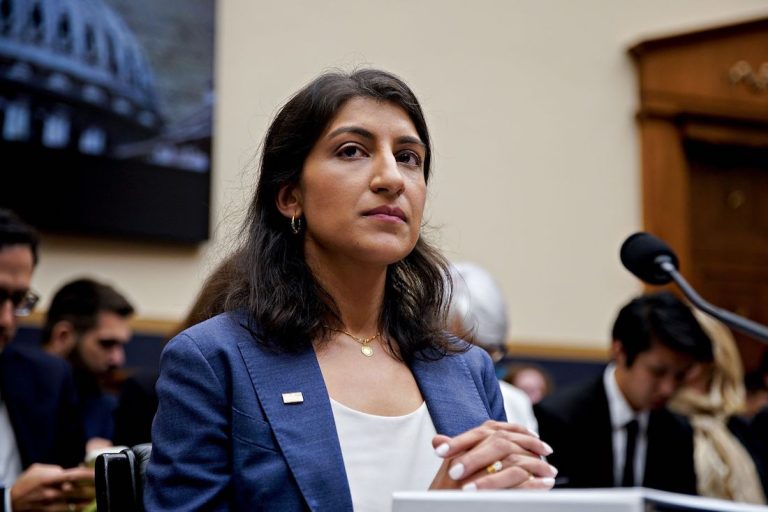
Born in London in 1989 to Pakistani parents, Lina Khan moved to the United States at the age of 11. She grew up in New York City, where her experiences as an immigrant and exposure to the complexities of the American economic system likely shaped her future perspectives. Khan attended Williams College, where she studied political science, and later Yale Law School, where her groundbreaking scholarship on antitrust law began to take shape.
New York, N.Y. In the landscape of American governance, few figures have garnered as much attention in recent years as Lina Khan, the Chair of the Federal Trade Commission (FTC). Appointed by President Joe Biden in June 2021, Khan’s rise to one of the most powerful regulatory positions in the United States has been nothing short of meteoric. At just 34 years old, she has become a central figure in the battle to redefine antitrust enforcement in the digital age, challenging the dominance of tech giants and pushing for more aggressive regulation to protect competition and consumers.
A Revolutionary Legal Mind
Khan first gained national prominence while still a law student, with the publication of her seminal paper, “Amazon’s Antitrust Paradox,” in the Yale Law Journal in 2017. In this article, she argued that the traditional antitrust framework, which focused primarily on consumer prices as the metric for competition, was ill-equipped to handle the complexities of modern tech giants like Amazon. She posited that these companies could harm competition even if they offered lower prices, by using their market power to stifle innovation, create barriers to entry, and exert undue influence over entire industries.
Khan’s argument was a direct challenge to the prevailing antitrust philosophy, which had dominated American legal thought for decades. Her work quickly gained traction among academics, policymakers, and activists who were concerned about the growing power of Big Tech. It also positioned her as a leading voice in the movement to rethink antitrust enforcement for the 21st century.
Chair of the FTC: A Bold New Direction
In 2021, Lina Khan was nominated by President Biden to serve as a Commissioner of the FTC, and shortly after her confirmation, she was appointed Chair, making her the youngest person ever to hold the position. Her appointment signaled a dramatic shift in the federal government’s approach to antitrust enforcement and consumer protection.
Under Khan’s leadership, the FTC has taken a more aggressive stance on regulating big corporations, particularly in the technology sector. She has focused on addressing the ways in which dominant firms may be using their market power to suppress competition and exploit consumers. This includes scrutinizing mergers and acquisitions that might have previously been approved under a more lenient antitrust regime.
Khan has also pushed the FTC to consider the broader impacts of corporate behavior, including its effects on innovation, worker rights, and privacy. This holistic approach marks a significant departure from the narrower, price-focused analysis that has traditionally guided antitrust enforcement.
Challenges and Controversies
Lina Khan’s tenure at the FTC has not been without controversy. Critics, particularly from the business community and some conservative lawmakers, argue that her approach to antitrust enforcement is overly aggressive and could stifle economic growth and innovation. They contend that the regulatory uncertainty created by the FTC’s new direction could have a chilling effect on business investment and expansion.
Moreover, some have questioned whether the FTC under Khan is overstepping its legal authority, pushing the boundaries of what the agency is empowered to do. This has led to legal battles, with several high-profile companies challenging the FTC’s actions in court.
However, Khan has remained steadfast in her belief that robust antitrust enforcement is essential to maintaining a competitive, fair, and innovative economy. She argues that the concentration of economic power in the hands of a few dominant firms poses significant risks to both the economy and democracy.
The Future of Antitrust
As Chair of the FTC, Lina Khan is at the forefront of a broader movement to modernize antitrust enforcement in the United States. Her leadership represents a generational shift in how regulators think about competition, consumer protection, and the role of government in overseeing the economy.
Khan’s influence extends beyond the FTC, as her ideas have resonated with lawmakers, academics, and activists around the world. She has helped to spur a global conversation about the need for stronger antitrust enforcement in the digital age, and her work is likely to have a lasting impact on how governments regulate big corporations.
Lina Khan’s tenure as FTC Chair is still in its early stages, but it is already clear that she is shaping the future of antitrust enforcement in profound ways. Her willingness to challenge long-standing legal doctrines and take on some of the most powerful corporations in the world has made her a transformative figure in American law and governance.
Whether or not one agrees with her approach, there is no denying that Khan has brought a new level of energy and urgency to the fight against monopolistic practices. Her work will likely define the trajectory of antitrust law for years to come, making her one of the most influential legal minds of her generation.
From Yale Law to FTC Chair: How Lina Khan is Taking on Big Tech (Aug. 18, 2024)
#LinaKhan, #AntitrustRevolution, #BigTechRegulation, #FTCChair, #PakistaniAmerican, #TechPolicy, #PakistaniAmerican, #YaleLawSchool
Tags: Lina Khan, Federal Trade Commission, antitrust law, Big Tech, digital regulation, Pakistani American, U.S. government, Yale Law School, Amazon’s Antitrust Paradox